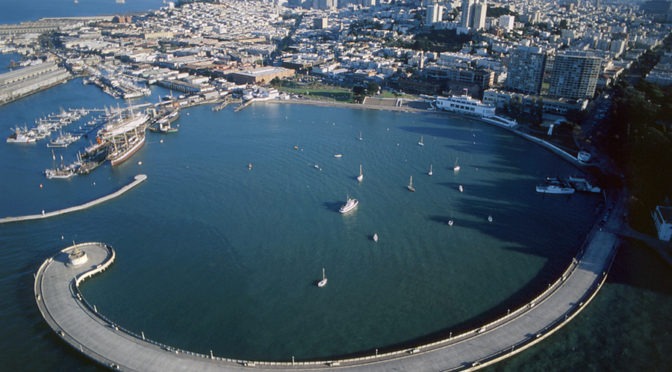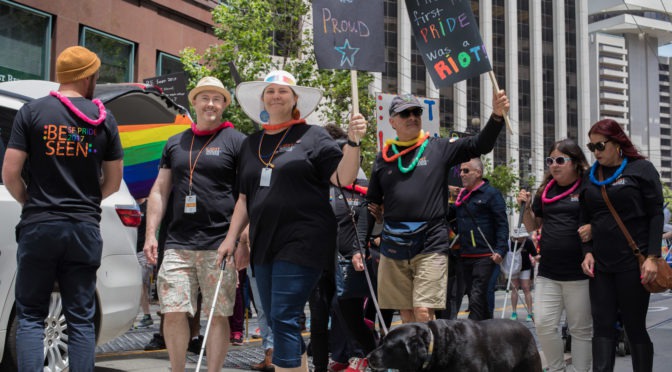When Sexual Health Services Program Coordinator Laura Millar plans a new sexuality workshop or spends months gathering a LightHouse contingent to march in Pride, she does it from the perspective of someone who needed a strong community around blindness and sexuality when there wasn’t one.
“I do it for the isolated me,” says Laura, strong in her vulnerability. She does it for her former self who wasn’t yet ready to accept her blindness but needed resources, community and a place to share and ask questions.
Legally blind herself, Laura conducts research that examines how individuals who are blind or low vision learn about and navigate the world of dating, sex and intimate relationships. She offers workshops, trainings and in-services for adults and teens who are blind or have low vision, their family members and the organizations that serve them, ensuring that sexual health information and services are comprehensive, inclusive and accessible for everyone.
But the work Laura does is mostly uncharted territory. The main researcher on sex education for the visually impaired, Gaylen Kapperman, acknowledges in a 2013 Sex Education Instruction, that “little information has been reported in the literature on all aspects of sexuality as it pertains to those who are visually impaired.”
“If no one’s showing you these things or talking about these things, where do you go?” says Laura.
Studies show that 61% of blind adults or those with low vision say their vision status had a negative impact on the way they were able to participate in sex education. With mainstream sex education barely covering the bases (only 24 states mandate sex ed at all; 20 require it to be medically accurate) where does that leave people who are blind or have low vision? And for people who lose their sight later in life, many are confronted with identity issues and questions about dating and exploring sexuality without sight.
This was the case for Laura. Throughout her Master of Public Health and Masters in Sexuality Studies, she was losing her sight to RP and found that when she explored different communities or took workshops around sexual health, she was always the token blind person or disabled person in attendance. This also meant that the courses were geared towards the “able-bodied” and rarely were familiar with the needs of individuals with disabilities.
She was also new to the Bay Area, pregnant and coming to terms with becoming a single mother. She had just relocated to start graduate school and didn’t know anyone other than the acquaintances in her new cohort, most of whom didn’t even know she was blind.
She first took out her cane when she was pregnant, after she fell trying to catch the bus. But she says it was out of necessity and not because she was ready to “be seen”. Throughout her pregnancy, she spent her time at school or in bed, online. In her isolation, she turned to adult blogging and sought solace in an online relationship.
“The whole world was at my fingertips, in a computer,” she says. “If it wasn’t for that, I wouldn’t have had a lot of meaningful human connection during that time. But it’s not the same as being in community.”
And as far as reaching out to the blindness community, Laura says, “Fear kept me away.” She was holding out hope for a cure for her blindness, and still lived life as if she were fully sighted, without learning any adaptive skills. When she finally sought services at LightHouse, a whole world of resources opened up to her.
As Laura reaches just over a year as the Sexual Health Services Program Coordinator at LightHouse, she’s heard countless stories similar to her own from other blind people. Stories about internet connections and online relationships, but also the dark side of isolation that involves self harm, self mutilation and self deprecation.
Laura acknowledges that a lot of people have similar feelings when it comes to understanding their sexuality. She finds this to be especially true in the blind community and disability spaces. “As a society we are incredibly uncomfortable talking about sex and disability, and that is without even getting into anything too taboo,” she says.
Laura’s programming is helping to change all of that. Over the next couple of weeks World of Sex will explore the kink community with Society of Janus presenters to demystify the kink community. “This is a wonderful opportunity for those who are curious to explore in a safe and supportive community” she says. For more information about those events visit the LightHouse Calendar.
“Each class, each workshop, normalizes the pieces of us,” says Laura. “I think every person that comes to something I do or is brave enough to show up, walks away with a little piece of them feeling seen. Even if it’s only themselves, seeing themselves. It’s healing. Being seen is as much about the outward being seen as the inward.”
Like her students, part of Laura’s journey with coming to terms with her own blindness and becoming a leader has been about unpacking her fear and embracing discomfort.
“Just by trusting myself and getting plugged in with other people on the same journey, I’ve finally been able to step out and be ‘blind and proud’,” she says.
A mentor once told her “‘You have to get comfortable being uncomfortable.’ Without those words, I don’t actually know that I’d be here,” she says. “I can’t tell you the number of times, I’ve been so uncomfortable. But no one else is doing this, and it needs to be done.”
Read the Bay Area Reporter’s recent write-up about the LightHouse Sexual Health Services Department.




